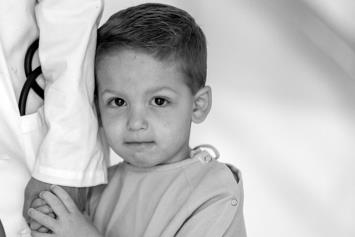Diffuse Midline Glioma (DMG)
A rare tumor often found in the middle area of the brain.
What Is Diffuse Midline Glioma?
Diffuse midline glioma (DMG) is a rare tumor of the central nervous system. Tumors begin in the brain (especially the thalamus, cerebellum and pons) or the spinal cord. They are a fast-growing cancer and can spread to other parts of the central nervous system. Up to 300 children per year are diagnosed with DMG.
What Causes Diffuse Midline Glioma?
In most cases, there is no known cause for DMG.
DMG happens when cells in the brain or spinal cord have a genetic change that allows cells to grow out of control. In some cases, these genetic changes are passed down from parents. People with neurofibromatosis type 1 or Li-Fraumeni syndrome, for example, are more likely to develop DMG. However, most children have DMG because of genetic changes that happen by chance.
What Are Signs and Symptoms of Diffuse Midline Glioma?
Because these tumors are fast-growing, symptoms may come on suddenly and get worse quickly. The symptoms depend on where in the brain or spinal cord the tumor or tumors are growing, but may include:
- Blurry or double vision
- Morning headaches with nausea or vomiting
- Irritability
- Problems swallowing
- Droopy muscles in the face
- Odd eye movements
- Loss of balance
- Weakness or numbnessSeizures
- Problems controlling the bladder or bowels
How Is Diffuse Midline Glioma Diagnosed?
DMG is diagnosed with a magnetic resonance imaging (MRI) scan and an exam to review your child’s symptoms. In some cases, the doctor may take a sample of tumor tissue (biopsy).
How Is Diffuse Midline Glioma Treated?
At Nationwide Children’s, your child’s care team will include neuro-oncologists, imaging experts, surgeons and a wide variety of pediatric experts who will work together to recommend the best path forward based on your child’s particular case.
Many DMG tumors are in deep or sensitive areas of the brain. If imaging shows the tumor may be possible to remove safely, your child may undergo surgery to take it out. However, removing tumors from some parts of the brain could cause serious, permanent damage to critical brain cells. To avoid lasting damage to breathing, vision, motor control and other major bodily functions, your child’s medical team may try to use radiation therapy and/or chemotherapy first. There are several medical options, as well as clinical trials, that may control the tumors.
In every case, a child’s therapy will be tailored to their needs. The care team will look at the number, size and location of the tumors and come up with a plan to maximize the chance at survival and minimize long-term problems.
What to Expect With Diffuse Midline Glioma
There is currently no permanent cure for DMG. Tumors that are successfully treated may come back, usually in the same places. Sadly, most children survive less than 1 year from diagnosis. However, survival depends on a child’s tumor size, location, genetic type, spread, response to treatment and more.
Talk with your child’s doctor about the chances of survival for your child based on his or her specific case.
When to Seek Help for Diffuse Midline Glioma
If your child has symptoms that sound like DMG, or if you are worried about your child’s health, call a doctor. If your child has been diagnosed with DMG and you would like a second opinion, or would like to come to Nationwide Children’s for treatment, please connect with our team.
Why Choose Nationwide Children's?
The Neuro-Oncology Program at Nationwide Children’s Hospital offers clinical excellence in treating children, adolescents, and young adults with brain and spine tumors. Your child will have access to doctors who are experts in different types of medical care. We call this multidisciplinary care. Depending on the specific tumor diagnosis and treatment plan, your team may include oncologists, neurosurgeons, radiation oncologists, clinical psychologists, rehabilitation medicine doctors, neurologists, endocrinologists, ophthalmologists, therapists (physical, occupational, speech, art, music), social workers, dietitians and/or pharmacists. These team members all work together with the family to provide the best care for the patient.
Cancer Clinical Research
Nationwide Children’s is a national leader in oncology research and clinical trials. There are many ongoing research studies aimed at improving outcomes for children and young adults with brain/spine tumors—understanding why these tumors develop and how to appropriately target them. We are members of all major pediatric brain tumor clinical trial consortia including Pediatric Brain Tumor Consortium (PBTC), Collaborative Network of Neuro-oncology Clinical Trials (CONNECT), Pacific Neuro-oncology Consortium (PNOC) and the Children’s Oncology Group (COG). We have many open clinical trials testing new drugs in difficult-to-treat tumors, including in DIPG.
Next Steps
Speak With Our Team of Experts
Our team would be happy to answer any questions or schedule an appointment.
Request an Online Second Opinion
If you are currently receiving care at another institution and would like a second opinion from experts at Nationwide Children's, we can help.



